10 Best Event Calendar Plugins for WordPress in 2024
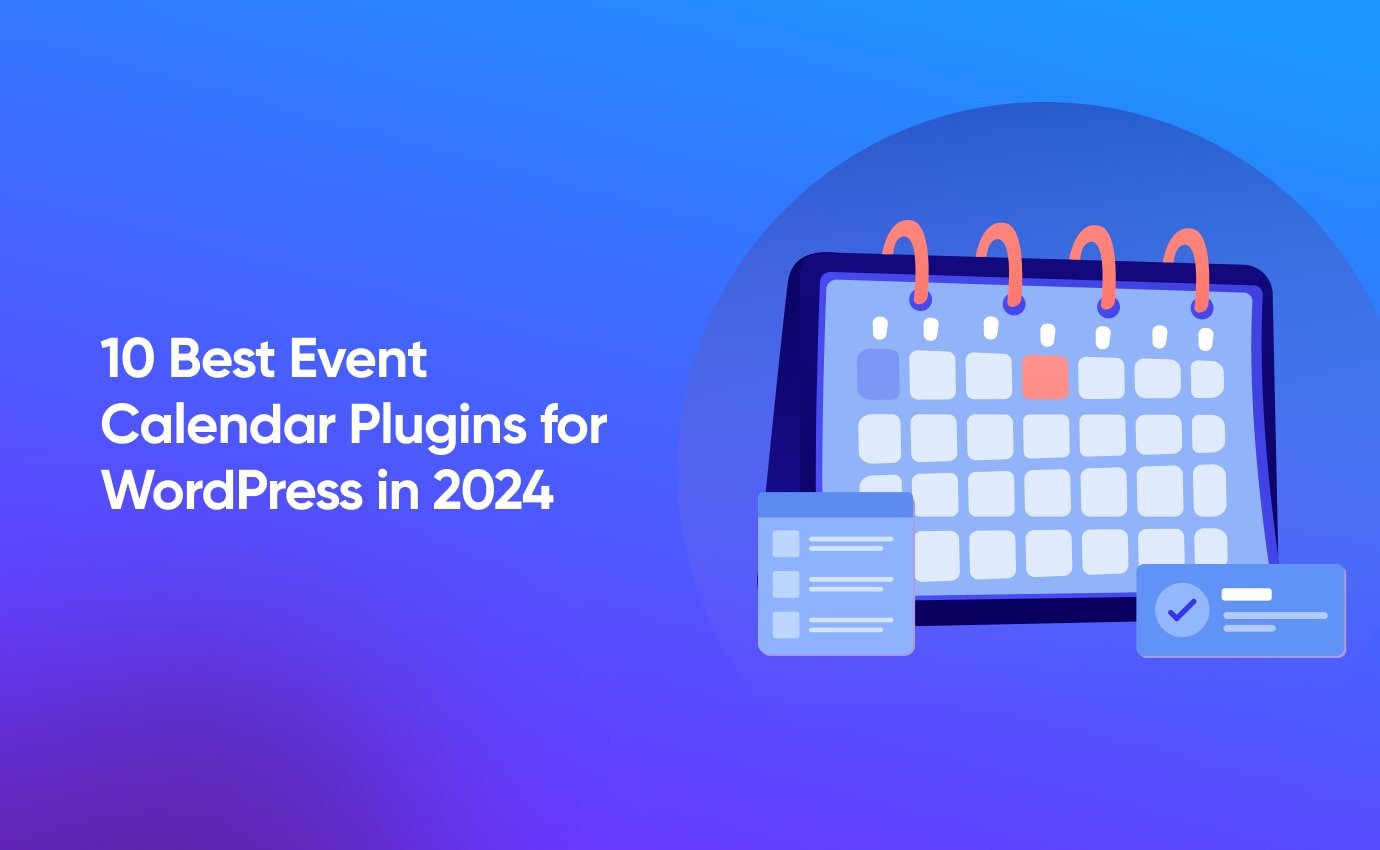
Picture this – You’ve poured hours into crafting the perfect content for your WordPress site, but something’s missing. You need a tool that will not only keep your readers informed but also engaged. A calendar, but not just any calendar—an event calendar plugin tailored to your unique needs.
As the heart of many thriving WordPress sites, the right plugin can make all the difference. But with so many options out there, how do you choose? If you’ve ever felt overwhelmed or just curious about the best picks, you’re in the right place.
In this post, we’ll journey together through 10 best event calendar plugins for WordPress. By the end, you’ll be equipped with the knowledge to choose the one that’s just right for you.
Ready to dive in?
What is an Event Calendar Plugin?
An event calendar plugin is a software add-on designed specifically for WordPress websites, aiming to provide users with the ability to organize, display, and manage events seamlessly. These event plugins cater to a wide range of requirements, from simple calendars that mark important dates to comprehensive event management tools that include features like ticketing, reminders, and integration with external services.
At its core, the primary function of an event calendar plugin is to showcase upcoming events in a calendar format, making it easy for website visitors to see what’s happening and when. Whether you run a business that hosts regular seminars, a non-profit organizing fundraisers, a community group with monthly meetups, or simply want a platform to share local happenings, an event calendar plugin can be the answer.
How to Choose the Best WordPress Plugin for Events

Selecting the best event calendar plugins for websites involves more than just picking the first option that comes up. With a plethora of plugins available, each offering varied features and functionalities, making an informed choice is paramount.
So, the market is crowded, and you should consider checking some factors before choosing any particular plugin for your next events.
Here’s a guide to help you in this endeavor:
- Understand Your Needs: Before diving into the sea of plugins, make a list of your specific requirements. Do you just need a simple calendar to display events, or are you looking for advanced features like ticketing, reminders, and recurring events?
- User Experience: Choose a plugin that offers a clean and intuitive interface. Visitors should be able to easily navigate through the calendar, view event details, and register or buy tickets if necessary.
- Mobile Responsiveness: Ensure that the plugin provides a mobile-responsive design. A significant portion of web traffic comes from mobile devices, so it’s crucial that your event calendar looks and functions flawlessly on all screen sizes.
- Customization: The plugin should allow you to tailor its appearance to match your website’s aesthetics. Look for options that offer multiple views (like monthly, weekly, or list views) and customizable event color schemes or layouts.
- Integration Capabilities: If you’re using other tools like email marketing platforms or payment gateways, opt for plugins that can seamlessly integrate with them.
- Support and Updates: Regular updates indicate that the plugin is maintained and compatible with the latest WordPress versions. Moreover, good customer support ensures that you’ll get assistance when you need it.
- Performance: Avoid plugins that slow down your website. Check reviews or forums to see if other users have reported performance issues.
- Security: Given that some best event calendar plugins for online events can handle transactions or personal data, ensuring they follow best security practices is essential. This includes regular updates, support for SSL, and data protection measures.
- Budget: While there are several free plugins available, premium ones often come with advanced features and dedicated support. Assess your needs against your budget. Sometimes, investing in a premium plugin can be more cost-effective in the long run.
- User Reviews and Ratings: Before settling on a plugin, check out its reviews and ratings on the WordPress plugin repository or other relevant platforms. This will give you insights into the plugin’s performance and reliability.
- Compatibility: Ensure that the plugin is compatible with your version of WordPress and any other plugins you might be using.
10 Best Event Calendar Plugins You Should Check Out
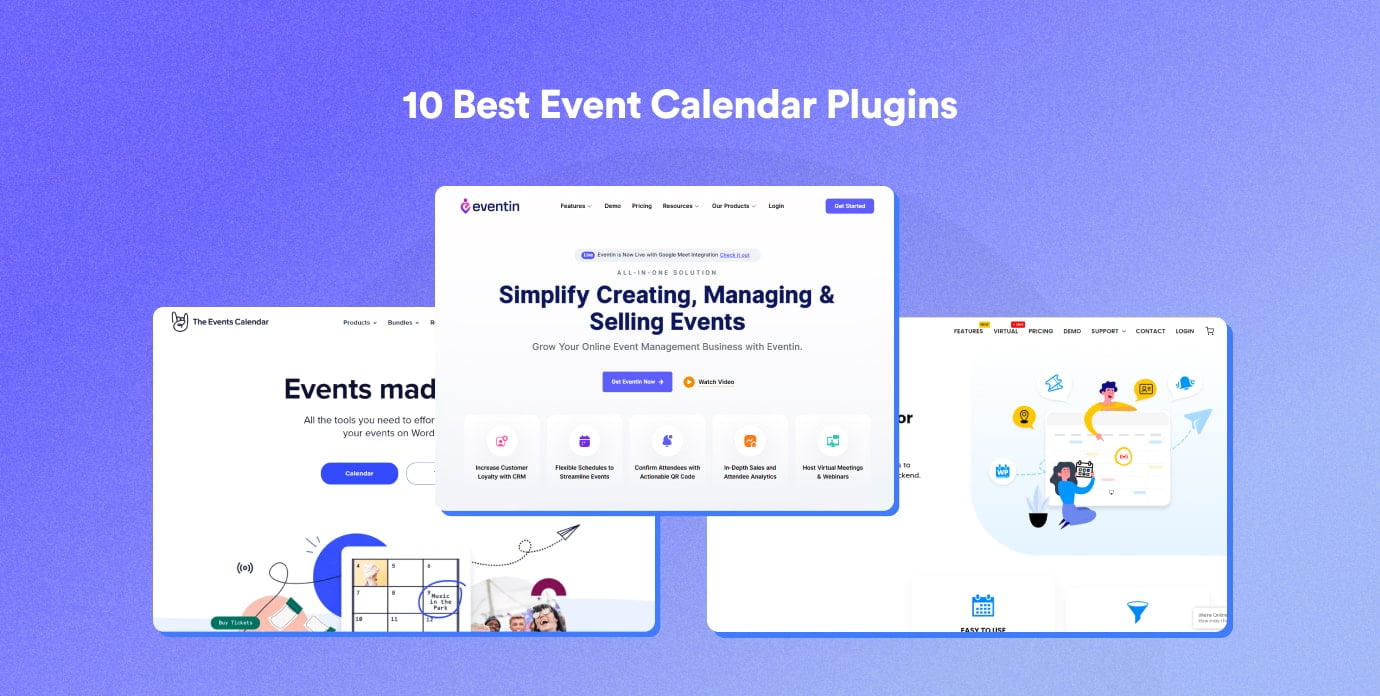
As mentioned earlier, there are many best event calendar plugins for websites available in the market. Since most of them offer essential features at affordable prices, selecting the right one can be challenging. Even if you attempt to choose the best event calendar plugin by following the process we’ve outlined above, you may still find yourself confused (trust me!).
In this article, we have compiled a list of 10 best event calendar plugins for websites that are feature-rich, user-friendly, and effective for managing your event scheduling efforts.
1. The Events Calendar for WordPress
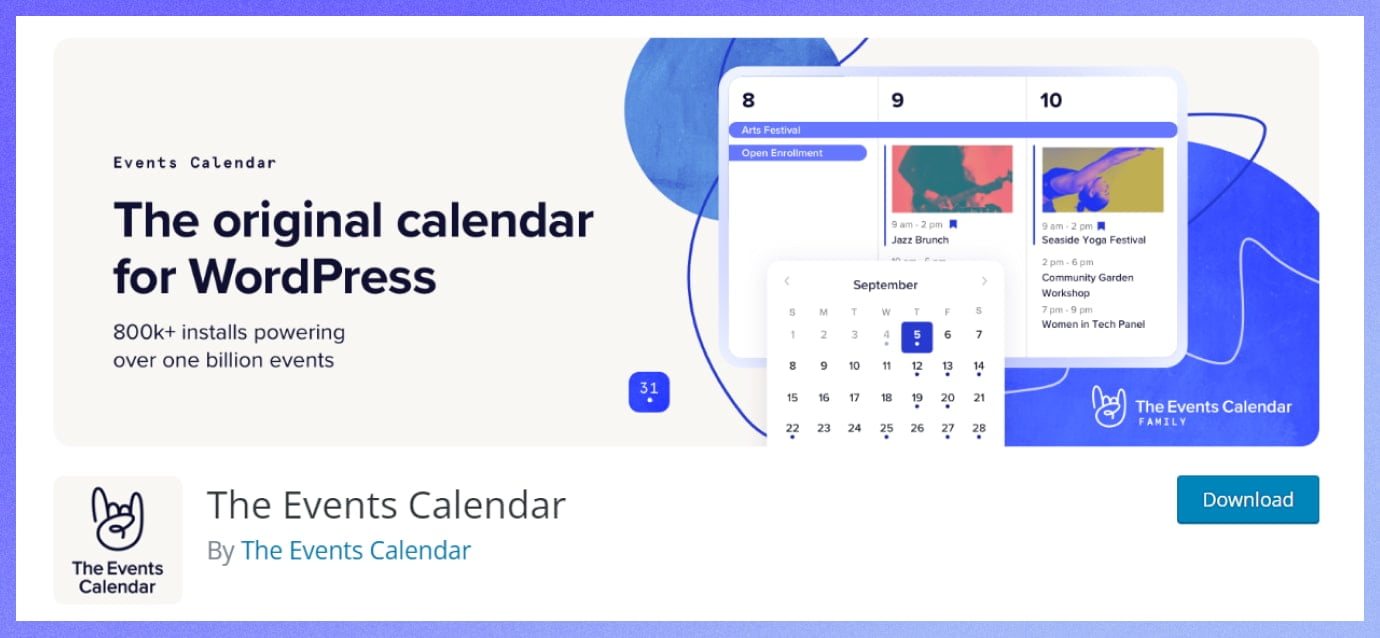
The Events Calendar is a highly versatile and user-friendly WordPress plugin designed to help website owners create event calendars and manage events with ease. With its intuitive interface and robust set of features, it’s become one of the go-to choices for both beginners and advanced users looking to integrate an event management system into their WordPress sites.
Who Should Use This Plugin:
- Bloggers hosting webinars or online sessions.
- Small to large businesses promoting seminars, workshops, or product launches.
- Non-profit organizations showcasing fundraisers, community events, or workshops.
- Educational institutions promoting classes, lectures, or seminars.
- Artists, musicians, or venues listing performances or exhibitions.
Key Features:
- Seamless WordPress integration with a native look and feel.
- Ability to create event calendars and manage unlimited events.
- Advanced widgets for displaying upcoming events.
- Supports both grid and list views for displaying events.
- Recurring events functionality.
- Venue and organizer information integration.
- Advanced search features that allow users to search by event, date, or location.
List of Integrations:
- WooCommerce: For ticket sales and event-related product sales.
- Event Tickets: Native suite to allow RSVPs and ticketing.
- Google Maps: For location features and map views.
- Eventbrite: For ticketing and event promotion.
- iCal and Google Calendar: For exporting and importing events.
Cons:
- The free version is limited in terms of advanced features; one needs to upgrade for more functionality.
- Some users may find the number of add-ons overwhelming or confusing.
2. Booking Calendar for WordPress
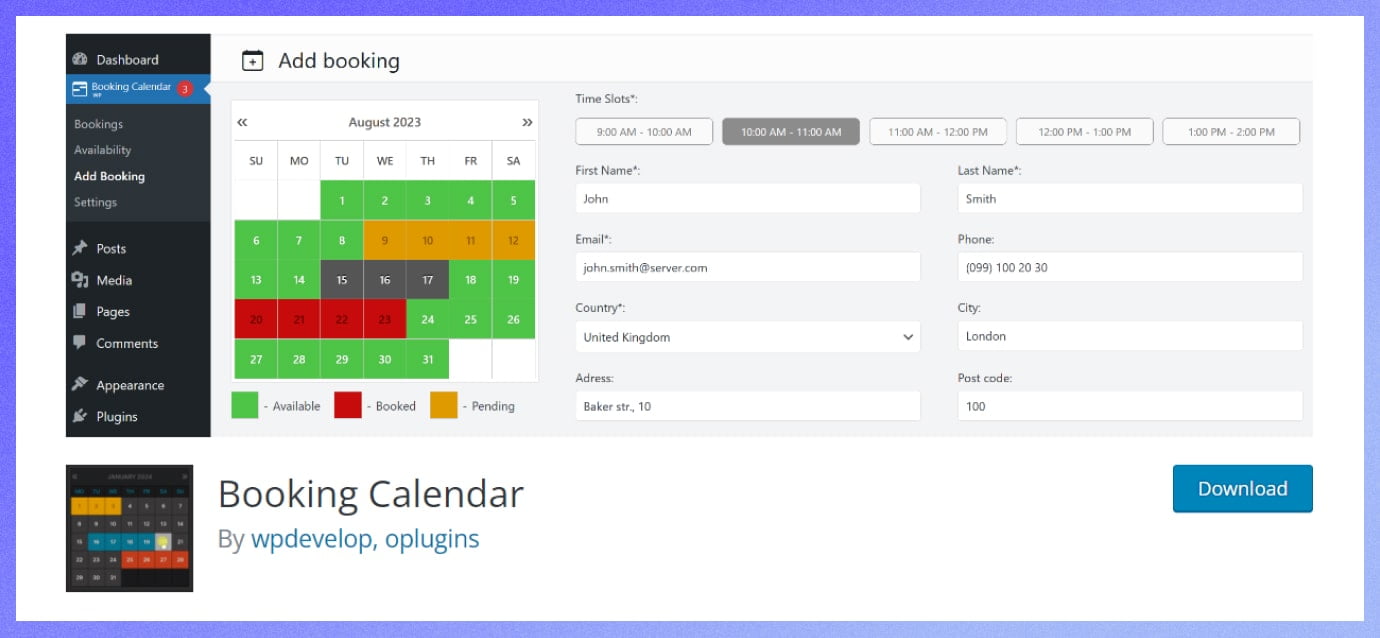
Booking Calendar is one of the oldest and most trusted booking plugins in the WordPress repository. It enables users to easily schedule and reserve items, making it a top choice for businesses ranging from hotels and spas to equipment rentals. With its user-centric design, both website admins and visitors can seamlessly manage and view bookings, respectively.
Who Should Use This Plugin:
- Hotels, motels, and other accommodation services looking for a reservation system.
- Spas, salons, and clinics accepting appointment bookings.
- Event venues or halls that require date reservations.
- Equipment or facility rental services.
- Professionals such as consultants, therapists, or trainers who need appointment scheduling.
Key Features:
- Intuitive booking system allowing visitors to check availability and make reservations.
- Admin panel to oversee and manage all bookings.
- Customizable event form fields to tailor the booking process according to your services.
- Email notifications for both users and admins upon booking or changes.
- Supports blocking specific dates/times from being booked.
- Ability to set varied prices based on seasons or specific days.
- Captcha support, ensuring genuine bookings and minimizing spam.
List of Integrations:
- WooCommerce: Integrating booking functionality with e-commerce features.
- WPML: For translating the booking system to multiple languages, making it globally usable.
- Google Calendar: For syncing booking dates and reminders.
- iCal: To export/import bookings.
- Stripe and PayPal: For handling payments related to bookings.
Cons:
- The free version, while feature-rich, has limitations that necessitate upgrades for businesses with more advanced needs.
- The default design might require additional customization to fit seamlessly with some website themes.
3. Events Calendar for Google
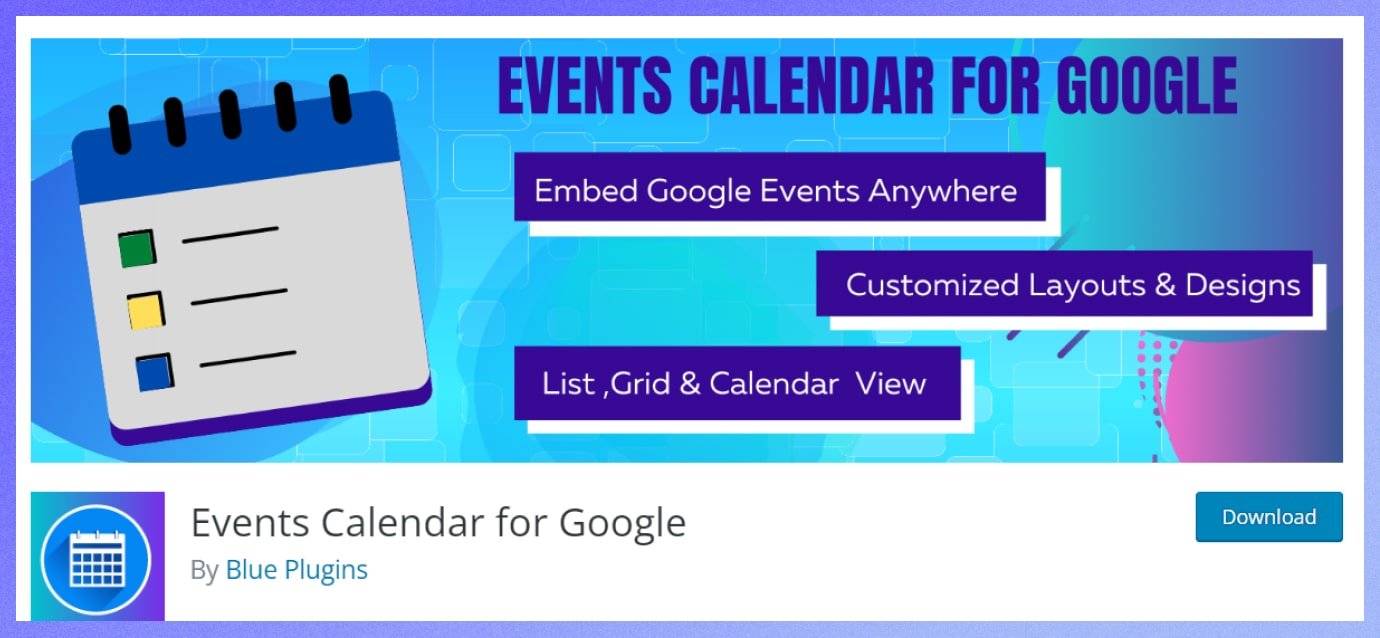
Events Calendar for Google acts as a bridge between your WordPress website and the ubiquitous Google Calendar, allowing you to display events from your Google Calendar directly on your site. This ensures synchronization across platforms and makes event management a breeze, especially for those already accustomed to using Google’s suite of tools.
Who Should Use This Plugin:
- Individuals or businesses that already manage events through Google Calendar and wish to display them on their website.
- Professionals, like consultants or trainers, who schedule sessions and want to show their availability or upcoming slots.
- Community organizations or clubs that utilize Google Calendar for event planning and want an integrated display on their website.
- Educational institutions looking to display academic calendars, lecture schedules, or other events.
- Any website owner who want an easy-to-use calendar plugin without additional event management overhead.
Key Features:
- Seamless integration with Google Calendar.
- Ability to display events in various views: list, grid, or monthly.
- Customizable appearance to match your website’s aesthetics.
- Automated event updates – changes in Google Calendar reflect on the website in real-time.
- Widget support for sidebars or footers.
- Shortcode enabled for easy insertion into posts or pages.
- Time zone synchronization to ensure event timings are accurate for all viewers.
List of Integrations:
- Google Calendar: Core integration, allowing for real-time sync of events.
- Google Maps: Displays event locations directly on the calendar, if location data is available in Google Calendar.
- Various themes: Adaptable to most WordPress themes for seamless design integration.
- Widgets and plugins that support shortcodes: For extended display capabilities.
Cons:
- Reliance on Google Calendar means users need to be comfortable with Google’s platform for event creation and management.
- Limited customization options compared to more dedicated and best event calendar plugins for websites.
4. Eventin : All-in-One Events Calendar
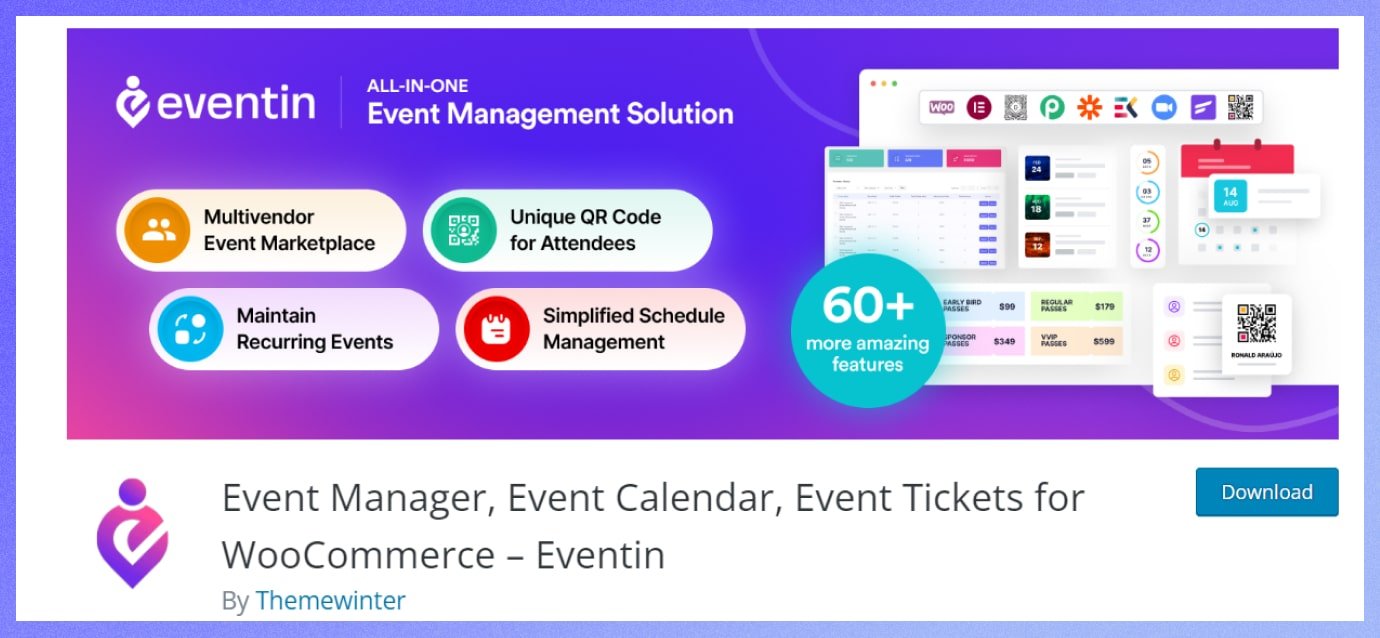
Eventin is a modern and responsive event management plugin designed for WordPress. With its clean interface and a plethora of features, it’s more than just a simple event calendar; it’s a comprehensive solution for those looking to organize events, sell tickets, and manage attendees. The plugin is geared toward making the event management process as streamlined as possible.
Who Should Use This Plugin:
- Conference organizers who are looking to manage speakers, schedules, and sell tickets.
- Concert or performance venues seeking online ticket sales and seat reservations.
- Non-profits or community groups organizing fundraisers or awareness events.
- Business enterprises promoting workshops, webinars, or seminars.
- Event planners or coordinators offering multiple events throughout the year.
Key Features:
- User-friendly event creation with drag-and-drop builder.
- Integrated ticket selling system, with options for varied pricing and discounts.
- Speaker management module, allowing for detailed profiles and schedules.
- QR code check-ins for easy attendee management.
- Support for recurring events.
- Event location and mapping features for attendee convenience.
- Customizable event email notifications for bookings, confirmations, and reminders.
List of Integrations:
- WooCommerce: For enhanced ticketing and payment options.
- Elementor: Seamless integration for those using the Elementor page builder.
- Fluent CRM: For email marketing and attendee outreach.
- Zoom and Google Meet: Enables online event or webinar hosting directly through Eventin.
- Google Maps: For precise event location mapping and directions.
Cons:
- Some advanced features are only available in the premium version.
- Initial setup might be a bit complex for absolute beginners.
Want to explore more? Here is the magic button 👇 to show you something interesting!
5. WP Event Manager Plugin
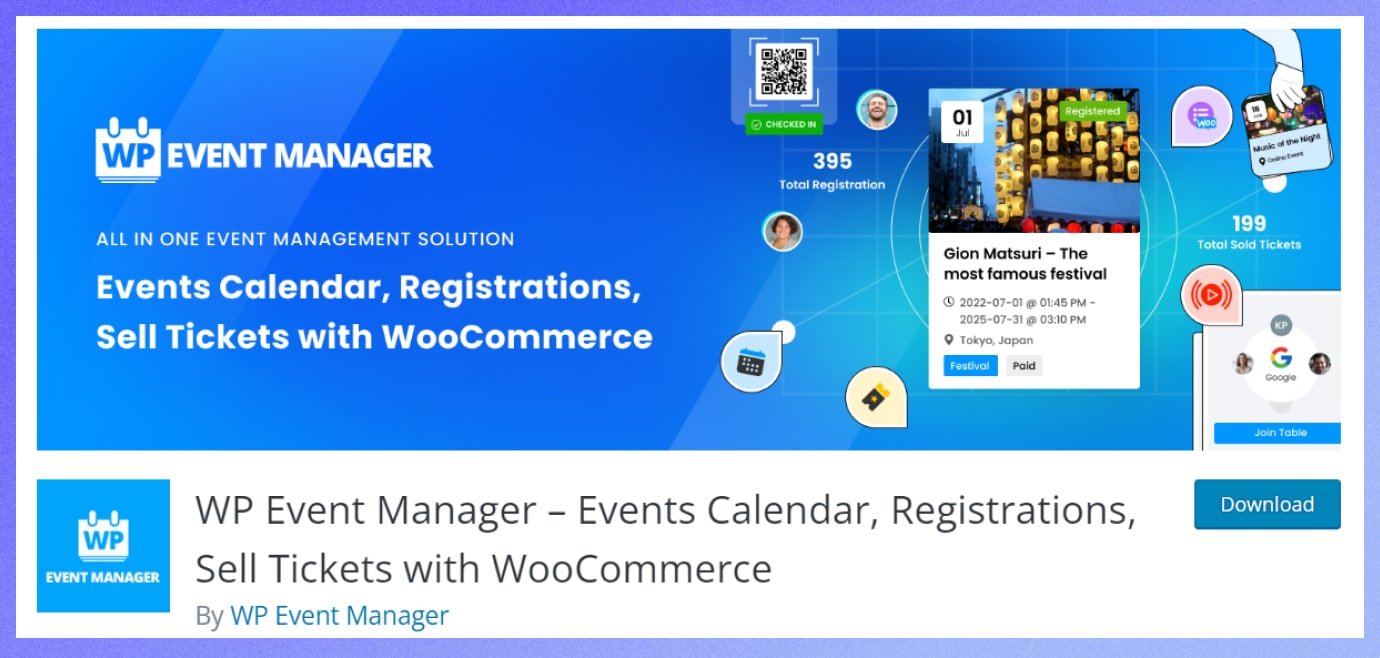
WP Event Manager is a lightweight, scalable, and full-featured event management plugin for WordPress. Tailored for all types of events, from webinars to large-scale business conferences, this plugin offers the right mix of ease-of-use and flexibility.
Who Should Use This Plugin:
- Event organizers looking for a straightforward solution to manage and display events.
- Website owners who want to add an event calendar without slowing down their site.
- Businesses hosting regular events, webinars, or workshops.
- Nonprofits and community organizers aiming for efficient event publicity.
Key Features:
- Responsive Design: Ensures your events look great on all device sizes.
- AJAX Powered: Faster and smoother user experience when searching and filtering events.
- Customizable Event Fields: Adjust event data fields according to your needs.
- Shortcodes: Easily embed events anywhere on your site.
- Widgets: Display events in sidebars or any widgetized area.
- SEO Friendly: Ensures your events rank well in search engine results.
List of Integrations:
- WooCommerce: Allows you to sell tickets and manage bookings.
- Google Maps: Display event locations with a visual map.
- iCalendar: Sync your events with external calendar apps.
- Mailchimp: Integrate your events with your email marketing campaigns.
- Zapier: Connect with hundreds of third-party applications for enhanced functionality.
Cons:
- May require some time for beginners to fully grasp all the features.
- Some advanced functionalities come as paid add-ons.
- The free version might not offer immediate or extensive support.
6. Event Organizer Plugin
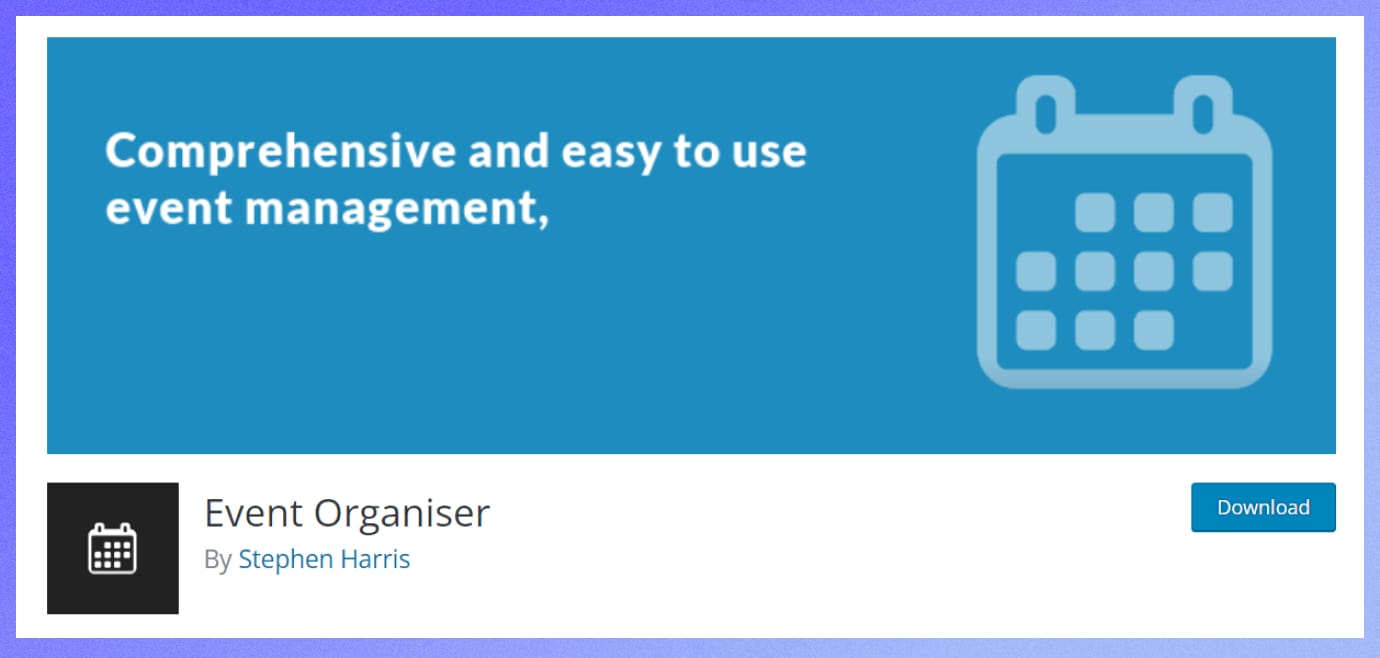
Event Organizer is a robust WordPress plugin tailored for event planning and management. Whether you’re orchestrating small meet-ups or large conferences, Event Organizer ensures a seamless integration with WordPress while offering intuitive tools for a comprehensive event setup. Here are the brief details on this plugin.
Who Should Use This Plugin:
- Event planners seeking a comprehensive solution with advanced scheduling features.
- Websites or online platforms centered around event curation and hosting.
- Community groups or institutions organizing recurring events or multiple-event series.
- Businesses who want to showcase events in a customizable event calendar format.
Key Features:
- Event & Date Management: Easily manage single or multi-day events.
- Recurring Events: Set up events that recur daily, weekly, monthly, or custom intervals.
- Venue & Location Support: Attach venues and generate Google maps for event locations.
- Booking Management: Handle free and paid bookings with ease.
- Custom Event Queries: Create event calendars based on custom criteria.
- Shortcode & Widget Support: Integrate events on any page or widget area.
List of Integrations:
- Google Calendar: Sync your events for broader visibility.
- Eventbrite: Connect and manage ticketing directly through the plugin.
- WooCommerce: Integrate event bookings with the popular e-commerce solution.
- BuddyPress: Seamlessly incorporate events into community-driven sites.
- MailChimp: Drive more participation through integrated email campaigns.
Cons:
- Advanced features might be overwhelming for new users.
- To unlock the full potential, the paid version is often necessary.
7. Timely Calendar Plug in WordPress
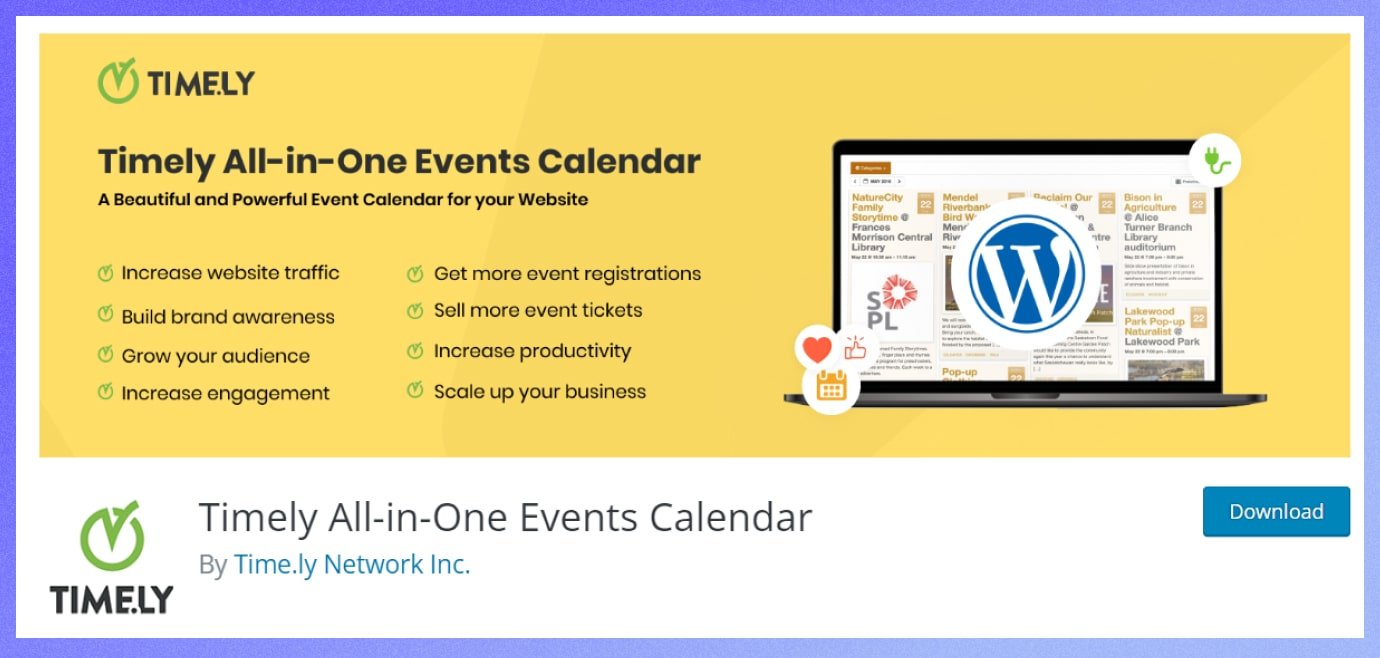
All-in-One Event Calendar is a powerful solution for WordPress users that combines visual appeal with feature-rich functionalities. Offering an intuitive interface, it is designed to cater to the needs of a broad spectrum of event managers, from novices to seasoned professionals.
Who Should Use This Plugin:
- Users seeking a visually appealing calendar view with color-coded events.
- Organizations that require an integrated event management solution with built-in social sharing features.
- Bloggers or content creators wanting to highlight upcoming events or webinars.
- Community managers and non-profits keen on driving participation through a well-organized event calendar.
Key Features:
- Theme Integration: Matches the look and feel of most WordPress themes for a seamless appearance.
- Recurring Events: Easily set up events that repeat over specific intervals.
- Filtering & Searching: Advanced filters to allow users to find events quickly.
- Embedded Google Maps: Directly show event locations for better user convenience.
- Import/Export: Easily migrate events to and from other calendar systems.
- Social Sharing: Built-in tools to promote events across major social platforms.
List of Integrations:
- ICS Feed: Sync with external calendars like Google Calendar or iCal.
- Facebook Integration: Automatically import Facebook events.
- WooCommerce: Seamlessly tie events with e-commerce functionalities for ticketing or merchandise.
- Time.ly Network: Push events to a broader audience via the Time.ly network.
- Eventbrite: Link and manage your Eventbrite listings from within the plugin.
Cons:
- With a large number of events, there might be slight slowdowns.
- Essential tools might be locked behind the paid version.
8. Stachethemes Event Calendar
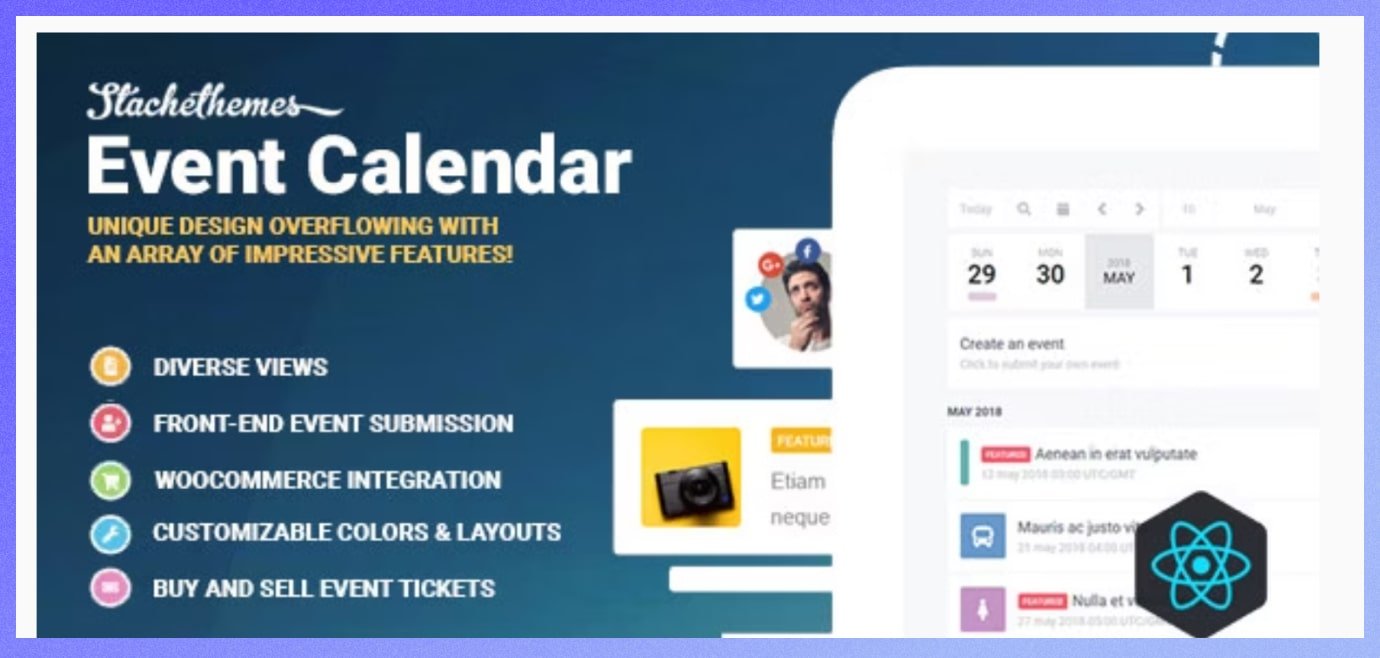
Stachethemes Event Calendar is a premium event calendar solution that seamlessly integrates with WordPress, offering an elegant design combined with a myriad of advanced functionalities. Designed to bring about a revolution in event presentation, it makes showcasing events a delightful experience.
Who Should Use This Plugin:
- Businesses and organizations keen on a visually immersive event display.
- Users aiming for a modern, responsive event calendar with multimedia support.
- Webmasters seeking a calendar with in-depth event details and scheduling options.
- Online communities and websites that want to offer rich event descriptions with images, videos, and even weather forecasts.
Key Features:
- WPBakery Page Builder: Offers a drag-and-drop builder for creating stunning event views.
- Multimedia Support: Allows the inclusion of images, videos, and soundcloud integration within events.
- Detailed Event Views: Showcase extensive event details, including weather forecasts, location maps, and schedules.
- iCal Support & RSS: Facilitates easy import and export of events.
- Guest List & RSVP: Allows attendees to confirm their presence and view guest lists.
- Reminders: Send notifications and reminders to attendees before the event.
List of Integrations:
- Elementor: Fully compatible with the popular page builder, allowing users to craft visually appealing event displays effortlessly.
- WPML: Makes the calendar multilingual-ready, ensuring you can cater to a global audience without language barriers.
- Google Maps: Directly embed and display event locations, providing attendees with easy-to-follow directions.
- OpenStreetMap: An alternative to Google Maps, it offers a robust platform to mark and guide users to event locations.
- OpenWeatherMap: Unique integration that provides real-time weather updates, giving attendees a heads-up on the conditions they can expect during the event.
- WooCommerce: Seamless integration to manage ticket sales, bookings, or any event-related merchandise, directly from your site.
Cons:
- Being a premium plugin, it comes at a higher initial cost.
- For the extensive list of features, it might have a slight impact on site speed.
9. Tickera WordPress Event

Tickera is renowned for its simplicity and robustness in the world of event calendar plugins for websites. Offering a straightforward approach to event management, this plugin effortlessly blends into your WordPress site, allowing users to promote events, sell tickets, and manage attendees without a hitch.
Who Should Use This Plugin:
- Event managers who regularly organize events and need a seamless system for ticket sales.
- E-commerce platforms that aim to integrate event ticketing with their online storefront.
- Conference hosts who host multiple events or sessions and require a dynamic calendar.
- Music and art festivals organizers who need to manage various ticket types, VIP passes, and general admissions.
Key Features:
- Front-end Ticket Selling: Sell tickets directly on your website without any third-party redirection.
- Barcode Ticket Verification: Offers a mobile app for easy ticket verification via barcodes.
- Multiple Ticket Types: Ability to set different ticket types like VIP, early bird, general, etc.
- Seating Chart Functionality: Allows attendees to pick their seats if applicable.
List of Integrations:
- WooCommerce: Integrate ticket sales directly into your WooCommerce platform.
- Stripe and PayPal: Secure payment gateways for reliable transaction processing.
Cons:
- Limited number of integrations
- Some users have reported delayed customer support responses.
10. EventON Events WordPress
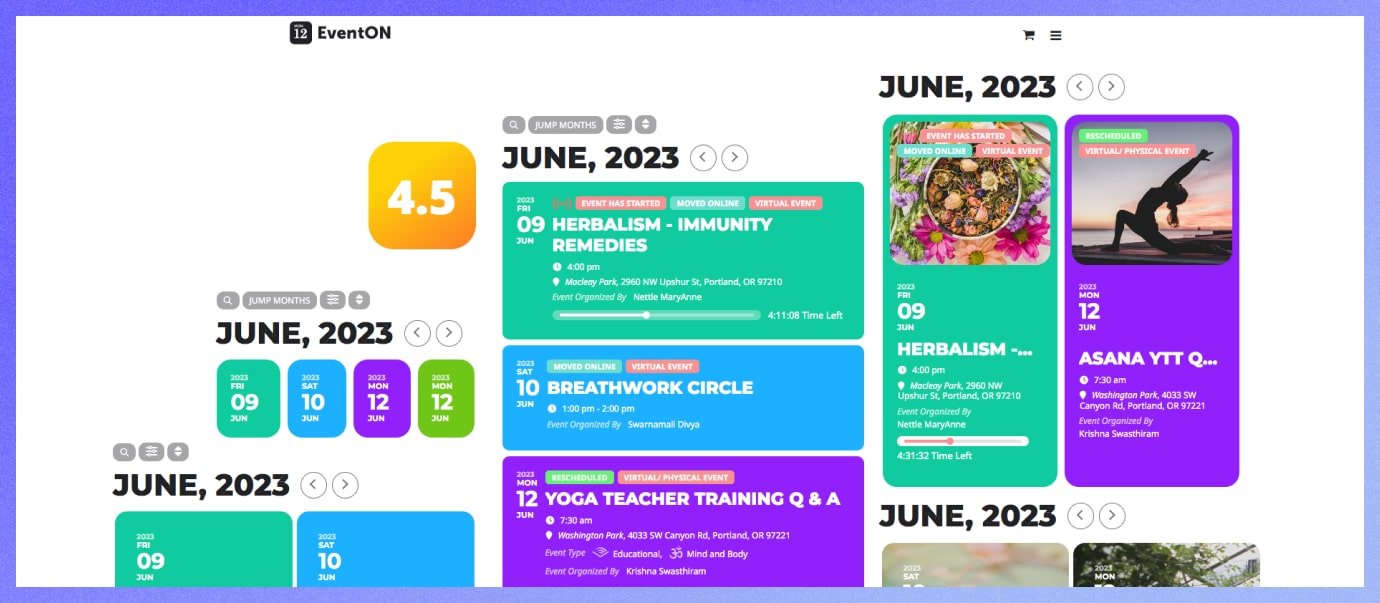
EventON stands out in the realm of the best event calendar plugins for online events due to its blend of aesthetics and efficiency. With a vibrant design and a plethora of customization options, it ensures your events are both eye-catching and organized.
Who Should Use This Plugin:
- Design-conscious brands that prioritize a stylish digital presence.
- Frequent event organizers with regular and varied events.
- Businesses with regular workshops that are ideal for showcasing frequent workshops or classes.
- Local community websites that display local events, from meetups to larger gatherings.
- Organizations with Multiple Event Types: Easily categorize and color-code varied events.
- Venues that host different events and want an appealing display.
Key Features:
- Organize as many events as you want
- Assign a highlighted image to your events
- Handle both single-day and multi-day events
- Facilitate events that span the entire day
- Option to conceal the end time of an event
- Support for events that last a month or a year
- Various event statuses available
- Different modes for event attendance
- Schedule recurring events: Daily, Weekly, Monthly, Annually, and Custom patterns
- Host virtual events through several third-party providers
- Adhere to health guidelines during events
- Spotlight specific events or exclusively showcase highlighted events
- Organize events into countless categories and sort through them accordingly.
List of Integrations:
- WooCommerce integration to make events bookable and purchasable seamlessly.
- Google Maps integration to embed locations to guide attendees.
- Event Tickets Add-on : In-plugin ticketing and attendee management.
- Jitsi integration for virtual events
- Zoom OAuth Integration
Cons:
- Should have included some popular page builders like WP Bakery, Elementor, etc.
- User interface should be more attractive
Check out this video on the 10 Best Event Calendar Plugins for WordPress in 2024!
Wrapping Up
Even though we’ve suggested 10 best event calendar plugins for WordPress website, choosing the right event calendar for your WordPress site can be a daunting task, given the myriad of options available. Remember, the best plugin isn’t necessarily the one with the most features, but the one that aligns best with your requirements and resonates with your target audience.
All plugins mentioned have their strengths, and depending on your needs, one might suit you better than the other. Hence, it’s necessary to list down your needs and pick up your desired plugin considering that.
🔥 More Relevant Blogs You Can Check Out!
🎯 Best WordPress Plugins for Your Website in 2024 | Read more
🎯 How to Create Recurring Events in a WordPress Site | Read more
🎯 [Easy] How to Create Event Countdown Timer | Read more



